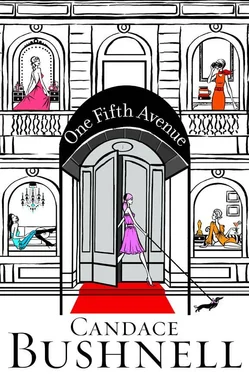Кэндес Бушнелл - One Fifth Avenue
Здесь есть возможность читать онлайн «Кэндес Бушнелл - One Fifth Avenue» весь текст электронной книги совершенно бесплатно (целиком полную версию без сокращений). В некоторых случаях можно слушать аудио, скачать через торрент в формате fb2 и присутствует краткое содержание. Жанр: Современные любовные романы, на английском языке. Описание произведения, (предисловие) а так же отзывы посетителей доступны на портале библиотеки ЛибКат.
- Название:One Fifth Avenue
- Автор:
- Жанр:
- Год:неизвестен
- ISBN:нет данных
- Рейтинг книги:4 / 5. Голосов: 1
-
Избранное:Добавить в избранное
- Отзывы:
-
Ваша оценка:
- 80
- 1
- 2
- 3
- 4
- 5
One Fifth Avenue: краткое содержание, описание и аннотация
Предлагаем к чтению аннотацию, описание, краткое содержание или предисловие (зависит от того, что написал сам автор книги «One Fifth Avenue»). Если вы не нашли необходимую информацию о книге — напишите в комментариях, мы постараемся отыскать её.
One Fifth Avenue — читать онлайн бесплатно полную книгу (весь текст) целиком
Ниже представлен текст книги, разбитый по страницам. Система сохранения места последней прочитанной страницы, позволяет с удобством читать онлайн бесплатно книгу «One Fifth Avenue», без необходимости каждый раз заново искать на чём Вы остановились. Поставьте закладку, и сможете в любой момент перейти на страницу, на которой закончили чтение.
Интервал:
Закладка:
At the tip of Manhattan, the white van containing Schiffer Diamond was crossing the Williamsburg Bridge to the Steiner Studios in Brooklyn.
Schiffer was also attempting to study a script — the pilot episode for Lady Superior — for which she had a table read that morning. The part was especially good: A forty-five-year-old nun radically changes her life and discovers what it means to be a contemporary woman. The producers were billing the character as middle-aged, although Schiffer still had a hard time accepting the fact that forty-five was middle-aged. This made her smile, thinking of Philip trying not to act surprised to see her in the elevator. No doubt he, too, was having a hard time accepting that forty-five was middle-aged.
And then, like Philip, she also recalled their sex life. But for her, the memory of sex with Philip was laced with frustration. There were rules about sex: If the sex wasn’t good the first time, it would probably get better. If it was great the first time, it would go downhill. But mostly, if the sex was really great, the best sex you’d had in your life, it meant the two people should be together. The rules were juvenile, of course, constructs concocted by young women in order to make sense of men.
But sex with Philip had broken all the rules. It was great the first time and great every time thereafter, and they hadn’t ended up together. This was one of the disappointments one learned about life — yes, men loved sex. But great sex didn’t mean they wanted to marry you. Great sex held no larger implications for them. It was only that: great sex.
She looked out the window at the East River. The water was brown but somehow managed to be sparkling as well, like a grand old lady who won’t give up her jewels. Why did she bother with Philip at all? He was a fool. When great sex wasn’t enough for a man, he was hopeless.
This led her back to her only conclusion: Maybe the sex hadn’t been as special for him as it had been for her. How did one define great sex, anyway? There were all the things one could do to stimulate the genitals — the kissing and licking and firm yet gentle touches, hands wrapped around the shaft of the penis and fingers exploring the inside of the vagina. For the woman, it was about opening up, spreading, accepting the penis not as a foreign object but as a means to pleasure. That was the defining moment of great sex — when the penis met the vagina. She could still remember that first moment of intercourse with Philip: their mutual surprise at how good it felt, then the sensation that their bodies were no longer relevant; then the world fell away and it seemed all of life itself was concentrated in this friction of molecules that led to an explosion. The sensation of completion, the closing of the circle — it had to mean something, right?
2
There were times now when Mindy Gooch wasn’t sure what she was doing in her job, when she couldn’t see the point of her job, or even exactly what her job was. Ten years ago, Mindy, who had been a cultural columnist for the magazine, who at thirty-three had been ambitious, smart, full of beans and fire, and even (she liked to think) ruthless, had managed to ratchet herself up to the head of the Internet division (which no one had really understood back then) to the tuneful salary of half a million dollars a year. At first she had flourished in this position (indeed, how could she not, as no one knew what she was doing or what she was supposed to do), and Mindy was considered one of the company’s brightest stars. With her sleek, highlighted bob and her plain but attractive face, Mindy was trotted out at corporate events, she was honored by women’s media organizations, and she spoke to college students about her “recipe” for getting ahead (“hard work, no job too small, no detail too unimportant,” words no young person really wanted to hear, though they were true). Then there were rumors that Mindy was being groomed for a bigger position, an executive position with domin-ion over many minions — the equivalent, she’d liked to think, of being made a knight in the sixteenth century. At that time, in the beginning of the upswing of her career, Mindy was full of a magical hubris that allowed her to take on any aspect of life and succeed. She found the apartment in One Fifth, moved her family, got herself on the board, got her son, Sam, into a better private kindergarten, made Toll House cookies and decorated pumpkins with nontoxic finger paints, had sex with her husband once a week, and even took a class with her girlfriends on how to give a blow job (using bananas). She’d thought about where she might be in five years, in ten years, in fifteen. She did have fantasies of flying around the world in the corporate jet, of heading up meetings in foreign countries. She would be a noble star while being silently and secretly beleaguered by the pressure.
But the years had passed, and Mindy had not fulfilled her promise. It turned out there were no extra innings in which to make her dreams come true. Sam had had a brief bout with “socialization issues”; the experts at the school thought he’d benefit by spending more time with other children — not unusual in a household consisting of a single child and two adults — requiring subsequent layers of organization and the forcing of Sam into afterschool sports, playdates (the apartment filled with the bells and whistles of video games as “the boys” engaged in side-by-side playing), and the pricey ski weekends in Vermont (during one such jaunt, Mindy sprained her ankle and was on a crutch for a month).
And then James, who had won the National Magazine Award in 1992, had decided to write fiction; after three years of what felt to him like hand-to-hand combat with the written word, he managed to publish a novel that sold seventy-five hundred copies. His depression and resentment permeated their lives, so in the end, Mindy saw that everyday life with its everyday disappointments had simply worn her down.
And yet she often thought, all this she could have overcome if it weren’t for her personality. Anxious and awake in the middle of the night, Mindy often examined the details of her interactions with “corporate” and saw they were lacking. Back then, corporate had consisted of people like Derek Brumminger, the pockmarked perpetual teenager who seemed to be in a never-ending quest to find himself; who, when he discovered that Mindy had no knowledge of seventies rock and roll, tolerated her in meetings with only the barest acknowledgment. It was silently understood that in order to become corporate, in order to be one of them, one had to literally be one of them, since they hung out together, had dinner at each other’s apartments, invited each other to endless nights of black-tie charity events, and all went to the same places on vacation, like lemmings. And Mindy and James most decidedly did not fit in. Mindy wasn’t “fun.” It wasn’t in her nature to be sassy or witty or flirtatious; instead, she was smart and serious and disapproving, a bit of a downer. And while much of corporate was made up of Democrats, to James, they were the wrong kind of Democrats. Wealthy, privileged Democrats with excessive pay packages were unseemly, practically oxy-morons, and after the third dinner party during which James expressed this opinion and Derek Brumminger countered that perhaps James was actually a Communist, they were never asked again. And that was that.
Mindy’s future was established: She was in her place and would go no further. Each subsequent yearly review was the same: She was doing a great job, and they were happy with her performance. They couldn’t give her a raise but would give her more stock options. Mindy understood her position. She was trapped in a very glamorous form of indentured servitude. She could not get the money from those stock options until she retired or was let go. In the meantime, she had a family to support.
Читать дальшеИнтервал:
Закладка:
Похожие книги на «One Fifth Avenue»
Представляем Вашему вниманию похожие книги на «One Fifth Avenue» списком для выбора. Мы отобрали схожую по названию и смыслу литературу в надежде предоставить читателям больше вариантов отыскать новые, интересные, ещё непрочитанные произведения.
Обсуждение, отзывы о книге «One Fifth Avenue» и просто собственные мнения читателей. Оставьте ваши комментарии, напишите, что Вы думаете о произведении, его смысле или главных героях. Укажите что конкретно понравилось, а что нет, и почему Вы так считаете.












![Кэндес Бушнелл - Есть ли еще секс в большом городе? [litres]](/books/398473/kendes-bushnell-est-li-eche-seks-v-bolshom-gorode-thumb.webp)